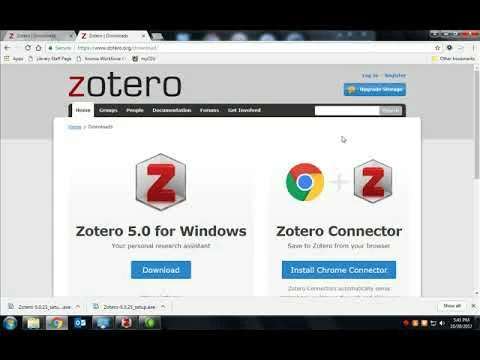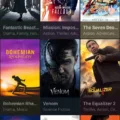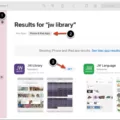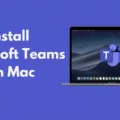Zotero is an open source software that enables users to collect, organize, cite and share research sources. It’s an invaluable tool for researchers and students alike who need to keep track of the vast amounts of informatin they are exposed to every day. The Zotero extension for web browsers makes it even easier to quickly add websites, articles, books and other digital sources to your personal library.
The Zotero extension works on most major web browsers including Chrome, Firefox and Safari and is available for free download. Once installed, it adds a small icon in the top right corner of the browser that can be used to capture information from any website you visit. When you click on the icon, a popup window will appear that gives you options for saving the current page as a book or article, or just saving the URL or webpage title.
Once saved in your Zotero library, this information can be easily organized into collections and subcollections which makes it easy to find what you need when you need it. Additionally, Zotero automatically stores all bibliographic data associated with each item such as author name(s), publication date and publisher information so you don’t have to type this out manually every time you cite a source.
The Zotero extension also integrates with several popular citation management tools including Microsoft Word, Google Docs and LibreOffice so you can quickly create properly formatted citations in your documents without having to manually enter any details. This feature alone can save hours of time when writing academic papers or preparing presentations!
Overall, the Zotero extension is an incredibly useful tool that helps make research more efficient by allowing users to quickly capture relevant webpages in their personal libraries while automatically storing all necessary bibliographic data associated with each item. It’s free, easy-to-use and highly recommended for anyone looking for a way to better manage their digital sources!

Using Zotero Extension in Chrome
Using Zotero with Chrome is easy! First, go to the Downloads page on Zotero.org and click the Download Connector button for Chrome. Follow the installation prompts from your browser and the connector icon will appear in your browser’s toolbar or add-on menu. Once installed, you can start using Zotero to save items from websites, organize research materials, create bibliographies, and more! To use the extension, simply click on the connector icon when you’re viewing a webpage with content you want to save or cite. You can then save it directly to your Zotero library or customize it befoe saving.
The Benefits of Using the Zotero Extension
The Zotero Connector is an extension that alows you to quickly and easily save and organize content found on the web. With a single click, you can save articles, books, images, videos, audio clips, and more directly to your Zotero library. The Zotero Connector also detects metadata such as author information, date created, and source URL for easy sorting and referencing. Additionally, the extension supports direct export of citations in a variety of formats including MLA, APA, Chicago/Turabian, BibTeX and RIS. Finally, with the Zotero Connector you can easily share your research with friends and colleagues via email or over social networks like Twitter and Facebook.
Does Zotero Have Chrome Extensions?
Yes, Zotero has a Chrome extension avaiable for download. The Zotero Connector for Chrome allows users to save articles, webpages, and other data to their Zotero library directly from the Chrome browser. This extension works with Zotero Standalone or Zotero for Firefox. It is easy to install and use, and it provides an efficient way to save research materials as you browse the web.
Using Zotero Without Downloading
No, Zotero is a downloadable application, and it must be installed on your computer in order to use it. However, Zotero does offer web-based features such as the Zotero Connector for Chrome and Safari that alow you to add sources from your browser directly into your Zotero library. These features are available without downloading the full application.
Installing Zotero Plugins
To install Zotero plugins, you must first close any open applications such as Word or Outlook. Then, open the Zotero Standalone App. Navigate to the Tools menu, then select Add-Ons and enable the Microsoft Word Add-in. This will add a new Zotero tab to MS Word which will contain the plugin. Once installed, you can use the plugin to create bibliographies and in-text citations quickly and easily in MS Word documents.
Using Zotero in Microsoft Word
Using Zotero in Word is easy and convenient. First, open your Zotero library and make sure you have the Zotero Toolbar installed in Word. Once the Zotero Toolbar is visible, you will need to select a referencing style. This can be done by clicking on the Insert Citation button, which will prompt you to choose your preferred style.
Once you have chosen the appropriate style, you can begin adding citations to your Word document. To do this, select the Insert Citation icon from the Zotero toolbar. A search window will open where you can type in keywords related to what you’re citing. Selecting a reference from the list of results will add it to your document as a footnote or endnote, depending on your chosen referencing style. You can also use the same icon to make changes to existing citations or create new references without leaving Word.
You can also use Zotero in Word to quickly generate bibliographies at the end of a document by ging into the References tab at the top of Word and selecting “Insert Bibliography.” This option allows you to pick from all of your references stored in Zotero and add them as a bibliography at the end of your document with just one click!
Comparing Zotero and EndNote
When it comes to reference management tools, Zotero and EndNote are the two most popular choices. Zotero is the preferred choice for many researchers because of its robust features and user-friendly interface. It is also more stable, cheaper, and easier to use than EndNote. Features such as Zotfile make it easy to extract highlights from PDFs, save annotated copies of documents, and create powerful search filters. Zotero also has a vibrant community of users who can provide support when needed.
EndNote is a more expensive option than Zotero and does not offer as many features as its competitor. The interface may be more complex for those who are not familiar with reference management tools, but EndNote does have a few advantages over Zotero. It can be integrated with word processing programs like Microsoft Word, which allows users to easily cite sources within documents without having to manually enter information into the software each time. EndNote also offers an online version that makes it easier to collaborate with other researchers on projects without having to worry aout file compatibility issues between different operating systems.
Ultimately, the choice between using Zotero or EndNote depends on what features you need and how comfortable you are with learning new software. For many researchers who need a quick and easy way to keep track of ther references, Zotero is the better option due to its lower price tag and wide range of features. However, if you need more advanced functions or need to collaborate with other researchers on projects then EndNote may be the better choice for your needs.
Installing Zotero in Word
Installing Zotero in Microsoft Word or LibreOffice is easy and straightforward. First, open Zotero and navigate to the Preferences menu (on Mac, Zotero > Preferences; on PC, Edit > Preferences). Then click Cite and then Word Processors. Finally, click Install Microsoft Word Add-In (or Install LibreOffice Add-in). Follow the instructions on the screen to complete the installation process. Once installed, you will be able to access all of your Zotero library from within Word or LibreOffice. You can cite references directly from Zotero into your documents, automatically generate bibliographies, and more.
Comparing Zotero and Mendeley
The main difference between Zotero and Mendeley is the type of content they support. Zotero specializes in supporting text-based content, such as articles, websites, and books. It offers a single-click capture option that works with many databases, catalogs, and websites. On the oher hand, Mendeley focuses on PDFs, allowing users to store and organize their research papers more easily. Additionally, Mendeley has a stronger website and community platform that can be used to collaborate with other researchers.
Does Zotero Work with Google Docs?
Yes, Zotero does work with Google Docs. It is easy to add citations to your document using Zotero. All you need to do is install the Zotero connector in your browser and then open Google Docs. You will then see a Zotero option added to your menu. To add a citation, you can choose “Add/edit citation” from the menu or click on the Z button in the Google Docs toolbar. You can also customize the formatting of citations and bibliographies directly within Google Docs and sync them with your Zotero library.
Compatibility of Zotero with Different Browsers
Zotero works with Firefox, Chrome, and Safari. The Zotero Connector allows you to add items from your web browser to your Zotero library. This means that you can use Zotero in whichever browser you prefer, or even multiple browsers at the same time. Additionally, the Zotero desktop application is availble for Windows, Mac OS X, and Linux.
The Safety of Zotero
Zotero is completely safe and secure to use, as it has been developed and maintained by the Roy Rosenzweig Center for History and New Media at George Mason University and the Corporation for Digital Scholarship. The software is constantly monitored and updated to ensure that users are provided with the highest level of security. All data stored in Zotero is completely private, encrypted, and backed up regularly. Additionally, the software is free to use, with funding from the United States Institute of Museum and Library Services, the Andrew W. Mellon Foundation, and oher sources.
The Benefits of Zotero Standalone
Zotero Standalone is a powerful open-source research tool and personal library manager. It is designed to help you collect, manage, cite, and share your sources of research. It gies you the ability to save references to books, articles, websites, images, audio and video files and much more. Zotero Standalone is a desktop application that can be installed on your computer so you can access your library even when you do not have the web browser extension available. By organizing your research materials in one place, Zotero Standalone helps make it easier to keep track of what you’ve read and written. With its intuitive interface, Zotero Standalone makes the process of citing sources in papers or other documents simpler and faster than ever before!
Adding Zotero to a Desktop
To add Zotero to your desktop, first go to the Downloads page on Zotero.org and click the Download button for the app. This will download an installation file to your computer. Then, from your Downloads folder, open the installation file and follow the prompts on your computer. Once you’ve completed the installation process, Zotero will be in your Programs or Applications folder. You can then launch the app and begin usng it right away!
Troubleshooting Zotero Not Working in Word
Zotero may not be working on Word if the Zotero Word for Windows Integration add-on is disabled. To make sure it is enabled, go to Tools ? Add-ons in Zotero. Additionally, both programs shoud be running as the same user, and neither should be running as administrator. If these conditions are not met, Zotero will not work properly.
Does Zotero Have a Word Plugin?
Yes, Zotero has a Word plug-in that allows users to insert citations, bibliographies and other reference elements into their Microsoft Word documents. The Zotero plug-in is automatically installed when you first start Zotero and is compatible with Microsoft Word 2016 or later on Windows, and Word 2016 or later on Mac. The plug-in enables the user to quickly insert references into a document from within Zotero, edit existing citations and bibliographies with the click of a button, and create entire bibliographies based on the contents of their library.
Troubleshooting Zotero Extension Issues
If your Zotero extension is not working, it could be due to a number of reasons. First, make sure that you have the latest version of the extension installed. If that doesn’t fix the problem, check and see if thee are any other extensions or plugins on your browser that might be conflicting with Zotero. You can try disabling all extensions except for Zotero to see if that solves the issue. If that doesn’t work, try uninstalling and reinstalling the Zotero extension. If none of those solutions work, then you may need to contact Zotero’s support team for further assistance.
Comparing Mendeley and Zotero: Which is Best?
It is difficult to say definitively wich is “best” between Mendeley and Zotero, as both have their advantages and disadvantages.
Mendeley is a citation manager that offers a great range of features such as organizing PDFs, creating in-text citations, creating bibliographies, collaboration tools, and integrations with other applications. It also has an interactive desktop app and mobile app for easy access. On the downside, it has limited storage capacity and only allws one group of up to three people for collaborations.
Zotero is a powerful citation manager that allows you to easily add book citations directly from the library catalogue. It offers similar features to Mendeley like organizing PDFs, creating in-text citations, creating bibliographies, collaboration tools, and integrations with other applications. Unlike Mendeley it also offers free unlimited storage capacity and allows you to collaborate with as many people as you want.
Ultimately the decision of which one to use comes down to individual needs; if you use a wide range of formats beyond PDF articles then Zotero might be the better choice whereas if you only use PDF articles then Mendeley might be more suitable.
Is Zotero an Open Source Software?
Yes, Zotero is open source. Developed by the Roy Rosenzweig Center for History and New Media at George Mason University, Zotero is an independent, nonprofit organization with no financial interest in its users’ personal information. The software itself is released under the GNU General Public License version 3, meaning that anyone can use, study, modify and redistribute it for free. This allws individuals to customize their experience of using Zotero, as well as to work with the underlying code to detect and fix any issues they may find. Additionally, all data stored in Zotero is encrypted and will not be shared or sold to anyone else without your explicit permission.
Does Zotero Store PDFs?
Yes, Zotero can store PDFs. When you use the Zotero Connector save button in your web browser, it can automatically save associated web page snapshots and PDFs. Whether these snapshots and PDFs are saved can be changed in the Zotero preferences. You can also manually add PDFs to Zotero by dragging and dropping them into the library, or using the ‘Create Item’ button in the top right corner of the library window.
Creating a Bibliography Using Zotero
Creating a bibliography in Zotero is simple! First, select the references or collections you want to include. You can hold down the control key and click to select multiple items at once. Once you have your references or collections selected, right-click one of the items and choose ‘Create Bibliography’. This will generate a bibliography of all of your selected items, which can then be exported as a Word document or other compatible file type. You can also customize the citation style and formatting options to suit your needs.
Using Zotero in a Browser
Yes, you can use Zotero in your browser. Zotero is compatible with Chrome, Edge, Firefox and Safari. To get started, you’ll need to install the Zotero browser connector for your chosen browser. The connector allows Zotero to save items from your browsing session directly into the Zotero library. Once installed, you should see a small icon on the right side of your address bar that indicats when a page is compatible with Zotero. You can click on this icon to save the page or other related items into your library.
Does Zotero Put User Data at Risk?
No, Zotero does not steal data. The Zotero plugin does not access any of your documents other than the ones on whih it is triggered. All communication and integration with Zotero happens entirely locally on your computer and nothing is sent to Zotero servers. Therefore, you can use the plugin without any worry of data being stolen or used in a malicious way.
Is My Zotero Library Private?
No, your Zotero library is not private by default. Unless you select the option to make it private, anyone who visits zotero.org will be able to view any items in your library. Your notes will remain private unless you select the option to make them viewable. To make your entire library private, go to the Privacy Settings page and uncheck the box next to “Publish Entire Library.”
Conclusion
Zotero is an innovative and powerful tool that provides users with an easy way to collect, organize, cite, and share research sources. With its intuitive interface and rich feature set, Zotero makes it simple to capture both online and offline resources, store them in a library, create citations for use in research documents or bibliographies, and even collaborate with others on shared projects. Zotero’s browser extensions make it even easier to capture data from websites and automatically generate citations. By providng students and researchers with a reliable platform for managing their sources, Zotero helps streamline the research process and save valuable time.








